Climbing Mount Kilimanjaro via the Machame Route is a truly remarkable experience that captivates adventurers from around the world. This scenic 7-day trek offers an excellent acclimatization schedule, making it accessible to hikers of various skill levels. Trekkers can expect to witness the mountain’s diverse landscapes, from lush rainforests to the barren alpine desert. While the climb requires moderate physical fitness, it does not necessitate technical climbing abilities. With the support of professional guides and a dedicated crew, the journey promises an unforgettable adventure. But what exactly can one expect to encounter along this legendary route?
Key Points
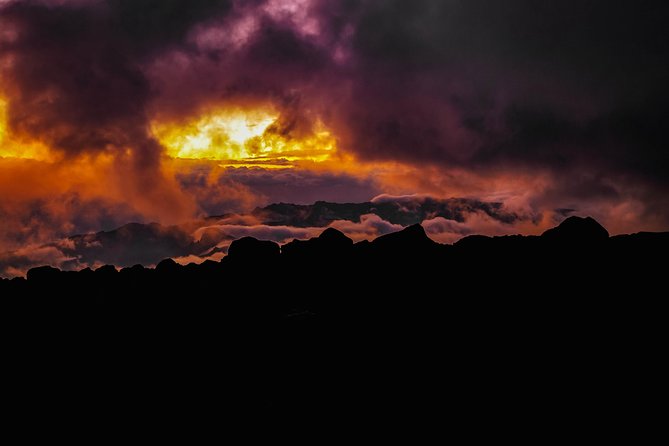
- The Machame Route is one of the most popular and scenic paths to climb Mount Kilimanjaro, with a 7-day itinerary allowing for excellent acclimatization.
- Moderate physical fitness is required, with long days of hiking and significant elevation gains, but no technical climbing skills are necessary.
- Certified guides and a comprehensive support crew ensure participants’ comfort, well-being, and efficient progress throughout the climb.
- Tented accommodation at designated campsites provides comfortable and functional lodging, allowing climbers to enjoy the natural beauty.
- The tour includes airport transfers, accommodation, national park fees, group equipment, meals, and guides/crew, but excludes airfare, visa fees, and personal gear.
Overview of the Machame Route
The Machame Route, also known as the ‘Whiskey Route‘, is one of the most popular and scenic paths up to the summit of Mount Kilimanjaro, Africa’s highest peak.
This 7-day climb offers an excellent acclimatization schedule, making it suitable for hikers of all skill levels. The route takes adventurers through diverse landscapes, from dense rainforests to barren alpine deserts, providing stunning views along the way.
Professional guides, certified as Wilderness First Responders, lead the climb safely, ensuring a comfortable experience with support services like tented accommodations, meals, and medical equipment.
The Machame Route’s captivating adventure and gradual ascent make it a sought-after choice for those seeking to conquer the ‘Roof of Africa’.
You can also read our reviews of more tours and experiences in Moshi.
Acclimatization and Fitness Requirements
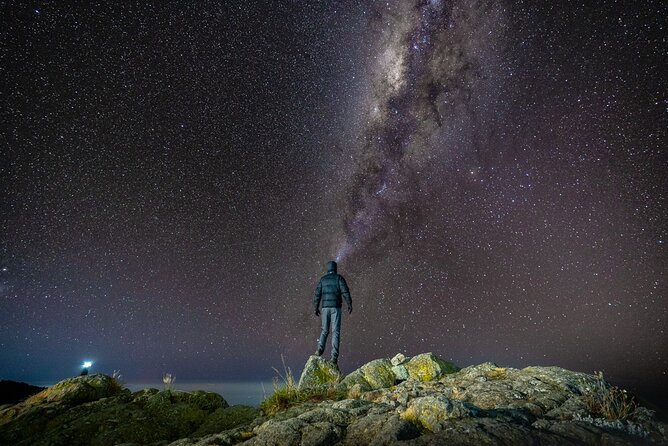
Typically, the Machame Route’s gradual ascent profile and appropriate acclimatization schedule make it a viable option for hikers of varying fitness levels.
Nonetheless, a moderate level of physical fitness is still required to successfully complete the 7-day trek to the summit of Mount Kilimanjaro. The climb involves long days of hiking with significant elevation gains, so participants should be capable of walking for 6-8 hours per day while carrying a daypack.
No technical climbing skills are necessary, but good cardiovascular health, strong leg muscles, and the ability to manage the physical and mental challenges of high-altitude trekking are essential.
With proper preparation and the guidance of experienced mountain guides, hikers of all backgrounds can conquer the ‘Roof of Africa.’
Professional Guides and Support Services
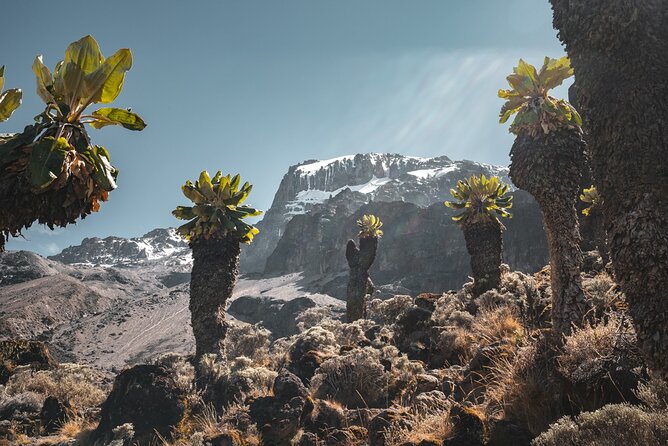
Along With the appropriate acclimatization schedule, the Machame Route’s success also relies on the expertise and support provided by the professional guides and climbing crew.
Certified as Wilderness First Responders, the guides lead the climb safely, ensuring participants’ comfort and well-being throughout the journey.
Alongside the guides, the climbing crew, including porters, camp masters, and cooks, work diligently to set up the tented accommodation, prepare meals, and transport the necessary group equipment and supplies.
With their extensive knowledge of the mountain and its terrain, the guides work closely with the crew to address any medical concerns and keep the group moving efficiently towards the summit.
This comprehensive support system is crucial for a successful and enjoyable Kilimanjaro climb.
Accommodation on Kilimanjaro
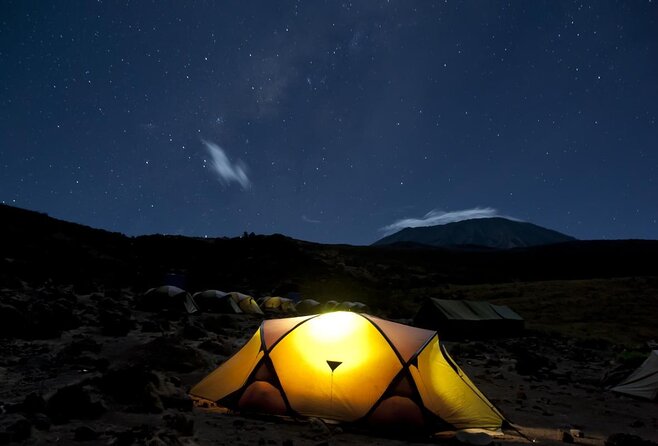
Tented accommodation on Kilimanjaro provides climbers with comfortable and functional lodging amidst the mountain’s rugged terrain. Outfitted with sleeping bags, sleeping pads, and other necessary equipment, the tents serve as the primary resting sites throughout the multi-day ascent. Porters expertly assemble and dismantle these mobile camps at each designated campsite, ensuring a seamless transition between the day’s trek and the evening’s respite.
| Camp Site | Elevation (m) | Distance (km) |
|---|---|---|
| Machame Camp | 3,010 | 11 |
| Shira Camp | 3,840 | 5 |
| Barranco Camp | 3,960 | 9 |
This tented setup allows climbers to enjoy the natural beauty of Kilimanjaro while staying warm, dry, and well-rested for the challenging trek ahead.
Included and Excluded Expenses
The Kilimanjaro Climb, Machame Route (7-Day) tour package includes a comprehensive set of services and amenities. This covers airport transfers, accommodation at Aishi Machame Hotel and on Kilimanjaro, national park fees, group equipment and supplies, meals, and a team of certified guides and climbing crew.
However, the package excludes airfare to Tanzania, visa fees, personal gear and equipment (though rentals are available), meals at the hotel, travel insurance, and tips for the crew.
Climbers should also be aware that the tour isn’t wheelchair accessible and may not be suitable for certain medical conditions.
Preparing for the Climb
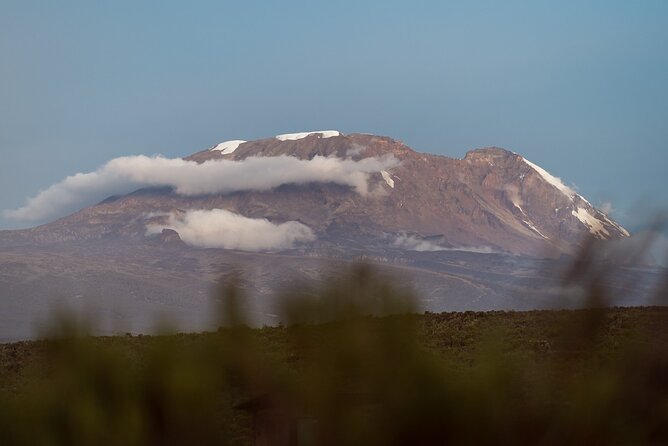
Prospective climbers must thoroughly prepare for the challenges of ascending Kilimanjaro through the Machame Route. They’ll need to ensure proper physical conditioning, acquire the necessary gear, and familiarize themselves with the itinerary and expected conditions on the mountain. A well-thought-out training regimen, including cardiovascular exercises and strength training, can help build endurance and stamina. Investing in quality hiking boots, layered clothing, and other essential equipment is crucial for comfort and safety. Understanding the daily mileage, elevation gains, and potential weather patterns will also allow climbers to anticipate and adapt to the demands of the trek.
| Preparation Checklist | ||||
|---|---|---|---|---|
| Physical Fitness | Gear Essentials | Itinerary Review | Acclimatization | Medical Precautions |
| Cardiovascular Training | Hiking Boots | Daily Distances | Altitude Adaptation | Pre-Existing Conditions |
| Strength Building | Insulated Layers | Elevation Gains | Hydration Strategies | Medications/Vaccinations |
| Endurance Exercises | Trekking Poles | Weather Patterns | Rest and Recovery | Travel Health Insurance |
| Regular Practice Hikes | Headlamps/Flashlights | Emergency Protocols | Proper Nutrition | Emergency Contacts |
Safety and Medical Considerations
While ascending Kilimanjaro, climbers’ safety and medical well-being are paramount concerns that require thorough preparation and vigilance.
The expedition provides trained guides certified as Wilderness First Responders, who closely monitor participants’ health and can administer oxygen and emergency medical care if needed.
Plus, the tour includes access to medical kits and equipment, such as portable altitude chambers, to address altitude-related issues like acute mountain sickness (AMS) promptly.
Climbers must disclose any pre-existing medical conditions to ensure appropriate precautions are taken.
The outfitter also recommends travelers obtain comprehensive travel insurance to cover potential emergencies.
With these safety measures in place, climbers can focus on the exhilarating journey to the roof of Africa.
Joining a Private Tour Group
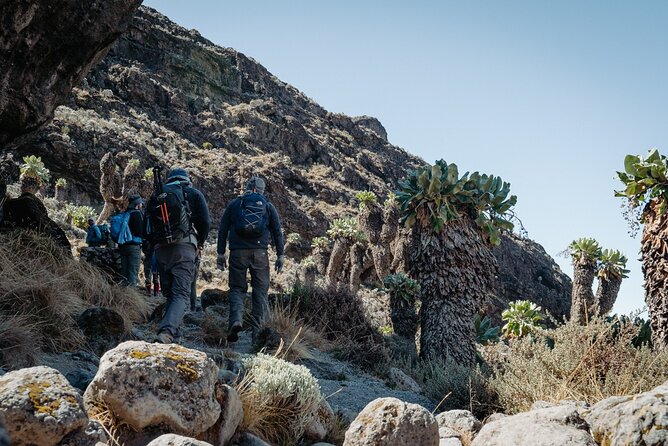
Embarking on a private tour group for the Kilimanjaro climb offers climbers a personalized and supportive experience throughout their journey. Rather than navigating the logistics alone, climbers can leverage the expertise of professional guides who’ll lead the way safely. The close-knit group dynamic also fosters camaraderie, allowing climbers to encourage one another and share in the exhilaration of reaching the summit. On top of that, private tours typically provide more comprehensive services, from pre-trip preparation to on-the-mountain amenities. This streamlined approach can make the overall experience more enjoyable and hassle-free for adventurers of all skill levels.
| Key Benefits | Private Tour Group | Individual Climb |
|---|---|---|
| Guidance | Professional guides | Self-navigation |
| Camaraderie | Close-knit group | Solo or small team |
| Convenience | Comprehensive services | More logistical planning |
Frequently Asked Questions
What Is the Typical Group Size for This Tour?
The typical group size is not specified, but the tour is described as a "private tour/activity, only your group will participate." This suggests the group size is flexible and tailored to the individual booking.
Can I Extend My Stay at the Hotel Before or After the Climb?
You can extend your stay at the Aishi Machame Hotel before or after the climb. The hotel offers accommodation options beyond the climb’s schedule, allowing you to customize your trip and explore the area further.
Is There an Option to Have a Private Porter Carry My Bag?
Yes, there’s an option to have a private porter carry your bag on this climbing tour. Clients can hire a personal porter to assist with their gear and luggage throughout the trek for an additional fee.
Can I Upgrade My Tent Accommodation on the Mountain?
Clients can upgrade their tent accommodation on the mountain for an additional fee. Upgraded tents typically offer more comfort and amenities compared to the standard tents included in the tour package.
How Often Do Rest Breaks Occur During the Daily Hike?
During the daily hike, hikers can expect to take regular rest breaks as needed to maintain a sustainable pace. The frequency of these breaks may vary based on the group’s fitness level and the terrain.
Recap
The Machame Route on Mount Kilimanjaro offers an exceptional trekking experience for hikers of all skill levels.
With its excellent acclimatization schedule, diverse landscapes, and comprehensive support system, this 7-day climb provides a successful and enjoyable challenge for those seeking to conquer Africa’s highest peak.
The route’s moderate fitness requirements and lack of technical climbing skills make it an ideal choice for adventurous travelers looking to take on the iconic Kilimanjaro.
More Tour Reviews in Moshi
- Private Tour to Materuni Waterfalls, Coffee Tour, Kikuletwa Hot Springs & Maasai
- 7-day Best of Tanzania Lodge Safari
- 4 Days Wildlife Tanzania Adventure
- Affordable Short Tanzania Safari (2 Days Camping Safari)
- 6 Days Mount Kilimanjaro Climbing via Rongai Route
- 8 Days Tanzania Adventure Tented Camps Safari
Not for you? Here's more things to do in Moshi we have recnetly reviewed
- 7 Best 3 Day Tours In Moshi
- 14 Best 4 Day Tours In Moshi
- 2 Best Private Car With Driver Services In Livingstone
- 4 Best Private Car With Driver Services In Moshi
- 15 Best Coffee Tours And Tastings In Moshi
- Marangu Route 6 Days 5 Nights/Kilimanjaro Climb
- Private 5-Days Serengeti Trails With Kojuu Safaris
- Full Day Private Safari – Tarangire National Park
- 9 Days 8 Nights Walking Safari
- Mt Kilimanjaro Climbing; 6 Days Machame Route
- Kilimanjaro Climb – 6 Days Marangu Route
- 5 Days African Safaris
